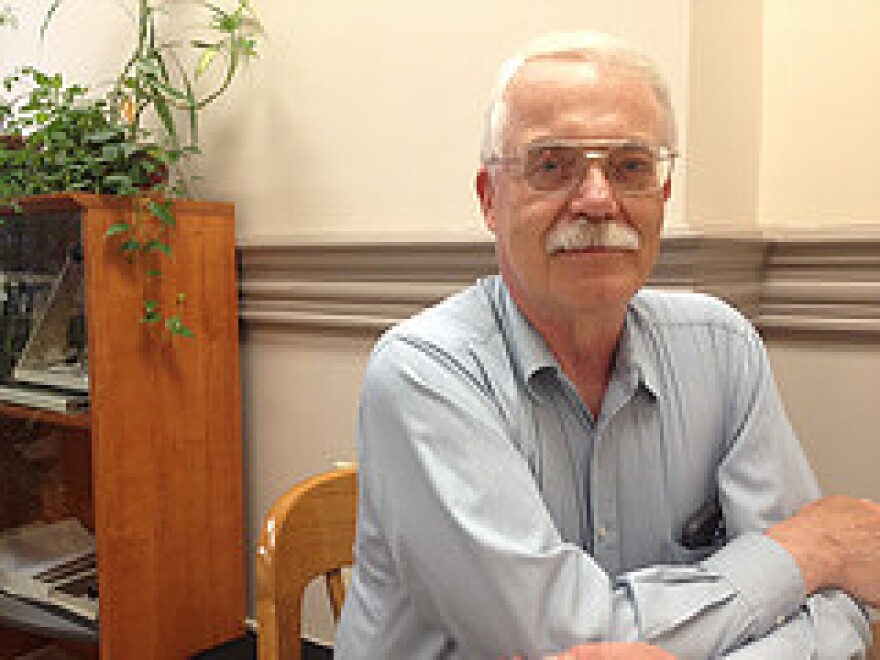Banks do it. Airlines do it. Hospitals do it. But should two Maine cities consider a merger? Lewiston and Auburn are exploring the idea through a joint charter commission.
Advocates see it as a way to strengthen and streamline an existing relationship. Opponents say it's a pie-in-the-sky idea that won't live up to expectations.
If you're looking for an example of how Lewiston and Auburn have worked together for mutual benefit, behold the Auburn/Lewiston Airport - or rather, the industrial park around it.
"The first building in the park was built by the Lewiston Development Corporation. Note we are in Auburn," says Chip Morrison, of the Androscoggin County Chamber of Commerce.
Morrison is also a member of the Lewiston-Auburn Joint Commission. In the '70s, Morrison says, Auburn and Lewiston formed a unique partnership to take this land, which had no taxable value, and turn it into an Airpark that today has a tax value of $23 million.
"The cities undertook the development of the Industrial Airpark together, because they didn't have the individual resources to develop it - which is, put in the water, the sewer, the roads, and the things you do for that," Morrison says.
It's just one example of various joint ventures the two cities have had over the years. They share a wastewater treatment plant. A railroad company. A bus system. An economic growth council.

"We have done an awful lot together, and we're at the point now that if we want to do more, we really need to start talking about merging some of our basic governmental functions, like police, fire, and public works," says Lewiston City Administrator Ed Barrett.
Barrett says the collaboration is so extensive it's actually somewhat cumbersome, with a separate board for each collaboration. And that kind of diffuses authority away from the elected officials and makes it more difficult to ensure that everybody is always on the same page," he says.
Dwindling resources are also a problem for the two cities. Lewiston has eliminated 30 positions in the past four years. Lewiston City Council President Mark Cayer says the fiscal savings from a merger are obvious.
"When both cities have to have two city administrators, two directors of code enforcement, two police chiefs, two fire chiefs, I mean, it doesn't take a rocket scientist to recognize that when two cities merge, there's going to be a reduction in department heads," Cayer says.
Cayer proposed the possible merger at a joint council meeting about a year ago. Citizens in the audience volunteered to gather signatures to put the issue on the ballot. In June, voters approved creating a joint commission to develop a consolidation agreement, which will again return to voters for approval or rejection.
Cayer says a merger will make the cities more fiscally strong. They'll flex more political muscle in Augusta by becoming the second-largest city in the state.
Perhaps most importantly, says Cayer, "What it's going to do is have our two communities, by virtue of being one city, moving in the same direction. Right now, our relationship with the city of Auburn has not been moving in a positive direction. I don't see us working together like we should be."
"No one's going to lull me to sleep that this romantic notion of a merged Auburn and Lewiston that somehow's going to go kick butt in Augusta and Washington," says Jonathan LaBonte is the Mayor of Auburn. He studied some of the cities' joint ventures previously as a consultant. While he's open to a merger, he's skeptical about the supposed benefits.
"While there have been partnerships, those partnerships have not been a model of efficiency," LaBonte says.

Others, including Auburn farmer Joe Gray, say the cities don't often see eye to eye. He thinks the merger would amount to a Lewiston takeover of Auburn "because they have many more voters than we have," he says. "So anything they want will go, anything that we want, probably won't."
And many point to the intricate challenges of a merger: dismantling of local governments; the aligning of personnel systems and union contracts; changing addresses and legal documents.
Lewiston School Committee Chair Jim Handy says he's troubled that he doesn't hear much talk about how the merger would impact the schools.
"I don't see there's an economy of scale that when you add so many schools together that one superintendent would be able to handle all the schools," Handy says. "I think it may require more administration. I think that's always a potential."
The idea for a merger isn't new. Various studies have examined the proposal over the past couple of decades. But some say the fact that the current plans were initiated by citizen vote could indicate a shift, says Lewiston resident Lisa Evans. "We already really do act as one community - L/A," she says. "I think it's a good idea. I think it's an absolutely great idea."
There will be plenty of time to mull it over. With no official timeline for the joint commission to create a plan, it could take one to two years before the ultimate decision whether to merge will go to a citizen vote.


